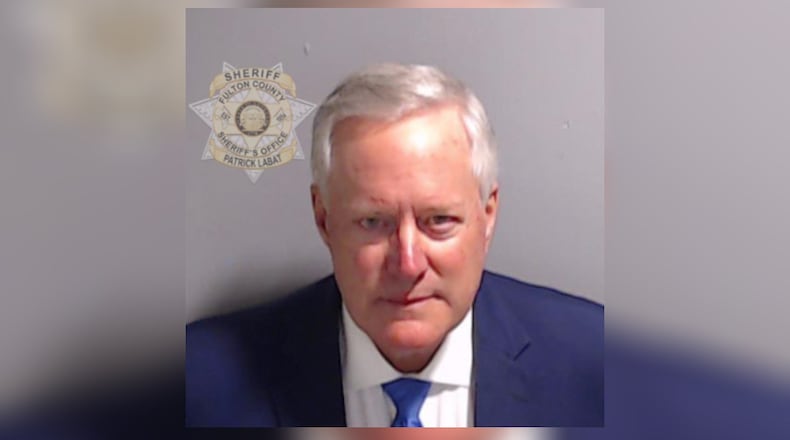Former White House chief of staff Mark Meadows today will present his case to move a sweeping election interference case out of Fulton County Superior Court to U.S. District Court in Atlanta.
The hearing could be one of the more important — and consequential — in the anti-racketeering case against former President Donald Trump and 18 of his allies. Legal experts say if Meadows succeeds in getting his case moved to federal court, all of his co-defendants may join him there.
Meadows is one of five defendants who are trying to transfer their case from Fulton County. U.S. District Court Judge Steve Jones, an appointee of President Barack Obama who has been assigned the removal cases, will oversee the hearing.
Aside from Meadows, former assistant U.S. Attorney General Jeffrey Clark and “alternate” GOP electors David Shafer, Cathy Latham and state Sen. Shawn Still have also moved to have their cases transferred. Trump is expected to do so as well.
The primary advantage to doing that is to get a broader — and more politically conservative — jury pool from the 10 counties that make up the U.S. District Court’s Atlanta division. In Fulton County, President Joe Biden won more than 72 percent of the vote in 2020.
To win a removal motion, defendants have to clear three hurdles: show that they were a federal official at the time of the alleged offense, show their alleged criminal behavior was carried out as part of their official duties and show they can raise “a colorable federal defense.” Legal experts say that is a fairly low threshold to clear if valid arguments can be made.
In Meadows’s court filing, his lawyers said the alleged criminal conduct “all occurred during his tenure and as part of his service as chief of staff.”
“Nothing Mr. Meadows is alleged in the indictment to have done is criminal per se: arranging Oval Office meetings, contacting state officials on the president’s behalf, visiting a state government building and setting up a phone call for the president,” the motion said. “One would expect a chief of staff to the president of the United States to do these sorts of things.”
The motion was referring, in part, to Meadows arranging the infamous Jan. 2, 2021, phone call between Trump and Secretary of State Brad Raffensperger as well as his December 2020 visit to the Cobb County Civic Center as a signature match audit was underway.
In response, the DA’s office opposed the removal request, saying Meadows violated the Hatch Act, which bars federal employees from engaging in political activity as part of their official roles.
“An evaluation of the actions named in the indictment makes clear that all of them were intended to ‘interfere with or affect’ the presidential election in Georgia,” the office said. “The activities are precisely the type which other courts have already determined to be ‘unofficial’ and therefore beyond the color of the defendant’s office, and he can point to no presidential authority that would bring the activities within the scope of his official duties.”
In recent days, prosecutors have filed notices that they have subpoenaed Raffensperger, former Secretary of State investigator Frances Watson and former Trump attorneys Kurt Hilbert and Alex Kaufman to testify at Monday’s hearing.
On Friday, not to be outdone, Meadows’s attorneys filed their reply to the DA’s motion and said “the federal government has a substantial interest in the proper administration of federal elections, even though the states also play an important role.”
The motion called the state’s Hatch Act claim “a red herring” and asserted any dispute about that is a matter for a federal judge to decide after the case is removed to U.S. District Court.
The dispute has attracted the interest of a number of prominent legal scholars, who filed their own motion opposing Meadows’s bid. They include former U.S. Solicitor General Charles Fried, former federal appeals court judge Michael Luttig, former acting U.S. Attorney General Stuart Gerson and former Massachusetts Gov. William Weld.
The alleged conduct charged in the indictment “bore no connection to any duty of Mr. Meadows’s, Mr. Clark’s or Mr. Trump’s office,” their filing said. “The Constitution entrusts the administration of federal elections to the states. It deliberately insulates such administration from the president and his staff. Consistent with that constitutional design, the federal officer removal statute does not permit removal here.”
About the Author
Keep Reading
The Latest
Featured



